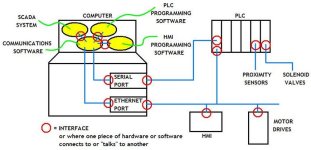Hello guys,
What is your suggestion, what is best way to learn and understand one system which contains some PLC, touch panels, motors....Are we first have to learn basic function or what this system have to do and how do it or first study a lot about components (generally) for specific manufacturer or some books or maybe all things by little.
In heart of question is, I need some advice, how I could improve my PLC skills, I know best way is would be some training program but here in Serbia offers is very poor and very expensive.
Yes, I know miracle is not possible over the night, good advice and suggestions from the people which are have huge experience sometime haven’t price, any links or book or good story how you acquiring your PLC knowledge.
Thanks in advice
What is your suggestion, what is best way to learn and understand one system which contains some PLC, touch panels, motors....Are we first have to learn basic function or what this system have to do and how do it or first study a lot about components (generally) for specific manufacturer or some books or maybe all things by little.
In heart of question is, I need some advice, how I could improve my PLC skills, I know best way is would be some training program but here in Serbia offers is very poor and very expensive.
Yes, I know miracle is not possible over the night, good advice and suggestions from the people which are have huge experience sometime haven’t price, any links or book or good story how you acquiring your PLC knowledge.
Thanks in advice






